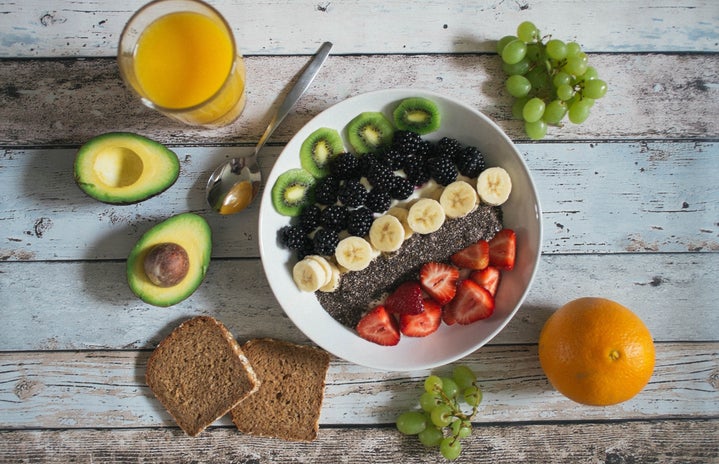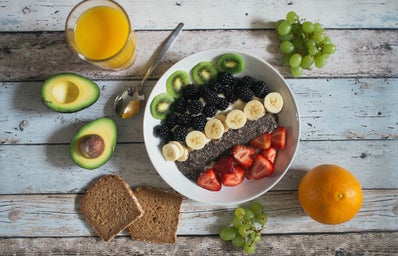Cigarettes, coffee and chocolate: if there were a conspiracy theory about addictive substances that start with the letter c, the next item on the list would be Coke (we’re talking about the drink here!). In a recent Her Campus survey, two-thirds of college women who drink diet soda named Diet Coke as their beverage of choice. What’s more, even though soft-drink sales have actually gone down since 2005, Diet Coke sales soared past those of Pepsi-Cola for the first time ever in 2010. The news not only reveals that the two reigning soda-pop juggernauts are both Coke products (Coke Classic is still sitting pretty in the #1 spot), but it also highlights the growing presence of “diet” beverages in our lives.
Myriad studies have surfaced in the past few years which suggest that our love for artificially-sweetened drinks may be unfounded and even dangerous. Since Diet Coke can usually be found in every other collegiette’s hand at any given time, Her Campus decided to investigate the health concerns associated with diet sodas to see what all the fuss is about. What’s more, we enlisted the expertise of Carnegie Mellon health specialist and nutritionist, Paula Martin, to see what other beverage options are out there.
An article on The Huffington Post profiled a woman named Ellen Talles who drinks about 2 liters of Diet Soda every day. Talles always makes sure that her cabinet is fully stocked and panics “like somebody who doesn’t have their pack of cigarettes” when she’s down to her last bottle. While the older woman’s case may not mirror everyone’s, Paula Martin notes that diet soda addictions aren’t impossible.
“Diet soda can be up to 200 times as sweet as regular soda,” Paula says. “What happens when you have something that your mouth tells you is really, really sweet is you drink it and you adjust. Then your brain begins to wonder where that sugar is and wants more.”
In an HC survey on diet soda, 83.3% of college-age participants said that they stick to drinking 1 or 2 bottles of soda from vending machines a day; while 16.7% drink three or four bottles a day. However, 30% of those surveyed reported that they experienced headaches or irritability when they went too long without a fix or tried to go cold turkey.
The “Heart” Truth
In 2008, the National Heart, Lung and Blood Institute formed a partnership with Diet Coke to spread awareness about heart disease and women’s health concerns. More recently, however, various news outlets including MSNBC, the LA Times, and ABC News have jumped on a new study which suggests that daily intake of diet soda increases soft-drink guzzlers’ chances of having a heart attack or stroke. Should collegiettes who include diet drinks among one of the principle items in their food pyramid reconsider their drinking habits?
“It’s important to ask ourselves what we’re displacing from our diets [by choosing these beverages],” says Paula. “From a health promotion standpoint, I cannot encourage something that is not health promoting. Aspartame doesn’t actually cause anything at this point, but it doesn’t promote health, either.”
[pagebreak]
A spoonful of (artificial) sugars
The artificial sweetener, aspartame, has been linked to everything from chronic migraines to, ironically, increased likelihood of obesity. The FDA (as well as other international health organizations) continues to approve the use of aspartame in soft drinks, but is something that is made from chemicals actually safe?
Paula says that we can assume so—at least for now. “[Aspartame] is the most widely used artificial sweetener in the country,” the nutritionist says. “Studies on aspartame are primarily rat-based and we don’t do large, epidemiological-based studies on humans, but the FDA has approved it and classified it as a food additive or food ingredient.” This means that the sweetener is not only used in our favorite red-capped bottles, but also in yogurts, canned-fruits, and other low-calorie products. “There are about 180 mg of aspartame in a bottle of soda, but we’re not just getting it from soda,” Paula emphasizes. “12 oz. each day is probably okay, but I am concerned about young women’s health and about the large volume of artificially-sweetened products [that they consume]. Aspartame is said to be safe for now, but it is being introduced into our food supply in doses more frequently and consistently than in any other generation.”
The reasons why college women seem to down these products is as confounding as it may be worrisome. An article published by the Vancouver Sun gave a rundown of the various artificial sweeteners that have cropped up over the years. Manufactured sugars such as NutraSweet and Equal are often promoted in weight loss campaigns, but there is very little proof which suggests that ordering a Diet Coke is any better than getting the real deal.
“No studies have shown that diet soda encourages weight loss,” Paula avers. “It doesn’t promote weight gain either, but there is an interesting psychology behind drinking diet soft drinks.”
The nutritionist reveals that people who drink diet beverages often lure themselves into thinking that they are eating more healthfully than they actually are. Diners may feel like they deserve a reward or leeway for snubbing regular soda and, as a result, become more likely to go for less nutritious meals. After all, a Big Mac and fries, a few extra swirls of fro-yo, or another helping of dessert don’t seem quite as bad if you’re making up for it by drinking “diet” soda.
Our reliance on diet products to make us feel better about the rest of our nutritional decisions may explain why only 2 out of 11 college women in the HC survey responded that they believed drinking diet soda helped them to lessen their sugar intake, but continued to drink up anyway. “[It doesn’t help] at all,” replied one Diet Dr. Pepper devotee who, in an effort to stop drinking diet soda, once forced herself to stop stocking the beverage in her apartment. “I go through phases,” the student replied. “I stop drinking it for a few months, then decide I want to start again.”
It seems like kicking the diet soda habit isn’t an easy one and that, at the very least, lessening our intake is far more realistic than going cold turkey.
Another one bites the dust
Therese Borchard, the Associate Editor of the psychology-based blog, World of Psychology, lamented the loss of diet soda in her own life. Borchard wrote that for someone who abstains from drinking alcohol and who is now “back to [her] boring sparkling water and lime,” Diet Coke was a nice option at cocktail parties. Foregoing diet soda seems to be just as difficult for college women who might be neglecting good old-fashioned water and dairy products, but still want a bit of bubbly in their lives.
Paula advocates that people who despair at the prospect of abandoning diet soda just start by getting creative. “Look at how much you’re taking in and try to reduce it,” she says. “Maybe if you have two bottles of diet soda, you try to go down to one. Sometimes what works for clients I work with is mixing. If you get a plain drink—maybe a juice that you like—and then fill it halfway with soda water, you reduce the concentration of artificial sweeteners.” A few HC survey respondents used similar tactics. One student became a fan of plain seltzer or seltzer mixed with other drinks, while another now swears by flavored waters. “I ask clients to think about the taste of aspartame,” the nutritionist says. “Once they identify that fake taste, they may not like it.” Another anonymous collegietteä agreed that taking a diet soda break can help to break the spell. “After giving it up for Lent, I realized that I never really like the taste. Now I only drink it once in a while when I get a craving.”
“But coffee?” she continued. “That’s a different story!”
Sources
“Diet Soda Addiction? How to Get Off the Can”, The Huffington Post
“Low-cal sweeteners feed a $1.5-billion industry”, Vancouver Sun
“Join Diet Coke and Wear Red for Women’s Heart Health”, Fitsugar.com
“Daily diet soda tied to higher risk for stroke, heart attack, MSNBC.com
“Is it healthy to drink diet soft drinks? The answer is fizzy”, USAToday.com
“Diet soda and heart, stroke risk: A link doesn’t prove cause and effect”, Los Angeles Times
“Diet Coke Wins Battle in Cola Wars”, WSJ.com
Images
DietSodas, The Epoch Times (David McNew, Getty Images)
HeartTruth, Fit Sugar
http://www.longislandpress.
http://energyfanatics.com/wp-

